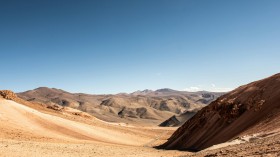Monday the Intergovernmental Panel on Climate Change released the Working Group II portion of its Fifth Assessment Report on climate change, reporting that the effects of climate change are already occurring on every continent and in all of the oceans in the world, and that in many circumstances, the world is not prepared for the impacts of climate change.
The IPCC report, which represents the most comprehensive climate assessment to date, details the impacts of climate change, the future risks of climate change, and opportunities to take effective action to reduce risk.
The report, "Climate Change 2014: Impacts, Adaptation and Vulnerability," was compiled by a team of more than 800 authors from around the world.
"We live in an era of man-made climate change," said Vicente Barros, a co-chair of the IPCC's Working Group II. "In many cases, we are not prepared for the climate-related risks that we already face. Investments in better preparation can pay dividends both for the present and for the future."
The IPCC reports that a "striking feature" of the study is that is that observable climate impacts are occurring all over Earth, from the tropics to the poles, in wealthy and poor countries and everywhere from small islands to large landmasses.
The report identifies vulnerable peoples, industries and ecosystems around the world. Rising temperatures will bring with it more cases of extreme weather, which can lead to food and water shortages and cause irreversible changes to ecosystems the world over.
"The report concludes that people, societies, and ecosystems are vulnerable around the world, but with different vulnerability in different places. Climate change often interacts with other stresses to increase risk," said Chris Field, a Working Group II co-chair.
The release of the report follows the Working Group I report in September 2013. The report from Working Group III is expected in April.
"The Working Group II report is another important step forward in our understanding of how to reduce and manage the risks of climate change. Along with the reports from Working Group I and Working Group III, it provides a conceptual map of not only the essential features of the climate challenge but the options for solutions," IPCC Chair Rajendra Pachauri said in a statement.
Andrew Steer, President and CEO of the World Resources Institute said that the warning signs of climate change went off long ago and now we are facing the consequences of our inaction.
"Climate change has already delivered severe economic damage and things will only get worse without more action. The report makes it clear that deep and rapid cuts in emissions can greatly reduce the costs of these impacts. Taking action now will undoubtedly be less expensive than waiting," Steer said in a statement.
"The choice is clear: We can wait and face a more dangerous and uncertain future, or we can embrace a more secure and prosperous direction."
© 2024 NatureWorldNews.com All rights reserved. Do not reproduce without permission.





